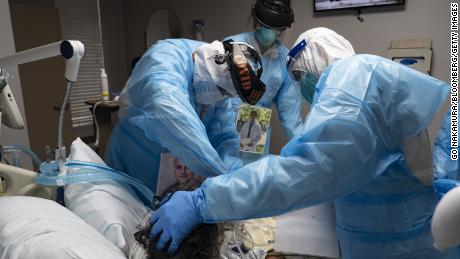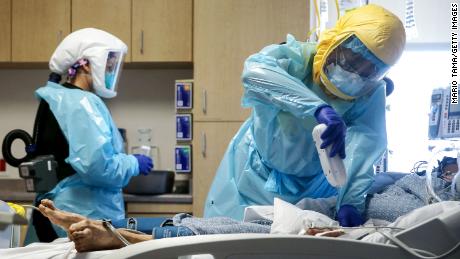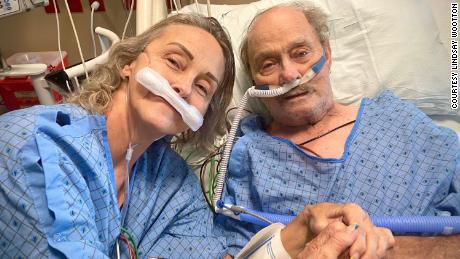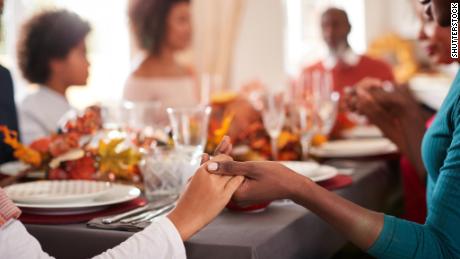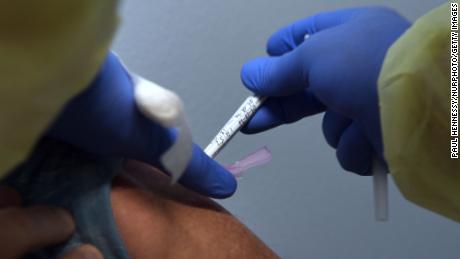States crack down as hospitalizations reach an all-time high
In the meantime, tens of thousands of lives could either be saved or lost, depending on how people act.
And Covid-19 could become the leading daily cause of death, said Dr. Peter Hotez, dean of tropical medicine at the Baylor College of Medicine.
“It’s more than just heading in the wrong direction,” he said. “We are on the verge of a humanitarian catastrophe.”
Why the ‘war’ against Covid-19 is getting worse
“Record cases over the past week will be record hospitalizations soon. Our/ YOUR communities and hospitals simply can not sustain high level care at this rate of increase.”
“We are truly at war with this virus. Our frontline troops are weary, and the enemy has us surrounded,” Adams wrote. “We MUST change the rate of rise of cases to alter our rapid rise in hospitalizations & preserve hospital capacity — and we can,” he said.
“If we don’t, more people will die.”
The hospitalization record is shattered, again
Hospitalizations will likely keep rising as new infections keep soaring.
And the increased case numbers aren’t just due to more testing.
The US has averaged 148,725 new Covid-19 cases per day over the past week, according to Johns Hopkins. That’s a 31% increase in new cases from the previous week.
But the number of new Covid-19 tests performed has increased only 10.42%, according to the Covid Tracking Project.
Bipartisan officials enact new restrictions
A growing number of Republican and Democratic governors have issued new mandates to try to stop the crisis from getting worse.
On Monday, Republican Gov. Mike DeWine of Ohio announced new limits on social gatherings, weddings and funerals.
“Despite the health order that limited mass gatherings to 10 people that was signed in April remaining in effect, we have seen rampant spread of the virus as a result of banquets, wedding receptions, and social gatherings following funerals,” the governor said.
“We have seen great tragedy associated with such events. It’s not the ceremonies causing the problem. It’s the party afterward.”
The revised order prohibits dancing or socializing in open, congregate areas. Guests must be seated, and food should be served to them at their seats. No more than 10 people can sit at a table, and those people must be from the same household.
Starting Thursday, all bars and restaurants in Oklahoma must close by 11 p.m. and restaurant tables must be 6 feet apart.
“We need to slow the spread of this virus,” said Republican Gov. Kevin Stitt. “Data shows that social distancing is harder to maintain as it gets later at night, especially in bars.”
Beginning Tuesday, state employees must wear masks in common areas or when they are close to other workers, Stitt said.
Those precautions include everyone quarantining for 14 days before the gathering, or quarantining for seven days before the gathering and getting a negative Covid-19 test result no more than 48 hours beforehand.
Outdoor gatherings will be limited to five people in Washington state, and restaurants and bars will be limited to outdoor service with capacity limits and to-go service. Stores, including grocery stores, are limited to 25% capacity.
In Oregon, Democratic Gov. Kate Brown announced a two-week “social freeze,” which includes limiting social gatherings, suspending indoor restaurant dining, and limiting the number of people who can gather for faith-based organizations.
And Republican Govs. Doug Burgum of North Dakota and Gary Herbert of Utah are among the latest to mandate face masks across their states.
“Right now, the data demands a higher level of mitigation efforts to reverse this dangerous trends, to slow the spread of the virus, and to avoid the need for any economic shutdowns,” Burgum said.
Former FDA heads under Trump and Bush call for mask mandates
Health experts have lamented the lack of a strong, coordinated federal response to this pandemic. So it’s “now up to governors” to enact tough restrictions to get Covid-19 outbreaks under control, two former commissioners of the Food and Drug Administration wrote.
“Americans are understandably tired of Covid, but accepting temporary restrictions now will help prevent even more painful personal and economic disruptions.”
Gottlieb worked in the Trump administration, and McClellan worked in the George W. Bush administration.
Many governors have taken aggressive steps to slow the spread,” they wrote, “but states that don’t act quickly put the entire nation at risk.”
‘This winter will be hard’
But let’s be clear: There will be no return to normal this year, BioNTech CEO Ugur Sahin said.
“This winter will be hard. We will not have a big impact on the infection numbers with our vaccine this winter,” Sahin told the BBC.
Last week, Pfizer CEO Albert Bourla said “we believe that we are in good situation to have up to 50 million doses this year, globally, and I believe we are in a very, very good situation to have 1.3 billion doses globally next year.”
But just like the Moderna vaccine, the Pfizer/BioNTech vaccine requires two doses for each person.
So if 50 million doses are available worldwide by the end of this year, that would mean 25 million people could get vaccinated.
CNN’s Melissa Alonso, Carma Hassan, Arnaud Siad, Naomi Thomas, Ben Tinker and Amanda Watts contributed to this report.
![]()




